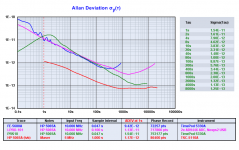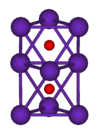Dear members,
Has anyone tried to compare an Rb clock, used as a master clock in a CD transport, to a combination of an external Rb clock used as a wordclock and connected to a CD transport, like does Esoteric with the G0/P0 models ?
In the first case, the clock's output frequency is 11M2896 or 16M9344 etc... depending on the CD transport model and in the second case, the clock's output frequency is 44K1, for the CD standard sampling frequency.
Which is the best way to go ? 🙄
Thanks.
Has anyone tried to compare an Rb clock, used as a master clock in a CD transport, to a combination of an external Rb clock used as a wordclock and connected to a CD transport, like does Esoteric with the G0/P0 models ?
In the first case, the clock's output frequency is 11M2896 or 16M9344 etc... depending on the CD transport model and in the second case, the clock's output frequency is 44K1, for the CD standard sampling frequency.
Which is the best way to go ? 🙄
Thanks.
An Rb clock may have amazing long term stability, but for CD playback you are looking for shorter term jitter, and in this they are VERY poor.
Avery well done xtal osc will sound far better.
Regards, Allen
Avery well done xtal osc will sound far better.
Regards, Allen
the better spec is low, close to carrier (audible frequency offset) phase noise
Yes this parameter seems to be of a better spec in OCXOs and Rb clocks : does it influence the jitter amount ?
Well... Maxime is producing this little baby here. MAX3624
Excellent S/R when it comes to Supply voltage and extreme low jitter.
Combined with a Rubidium clock do I think you could get the best from both worlds. Long term and short term stability, but I might be wrong. 😉😀
Excellent S/R when it comes to Supply voltage and extreme low jitter.
Combined with a Rubidium clock do I think you could get the best from both worlds. Long term and short term stability, but I might be wrong. 😉😀
MAX3624 looks good, but its output frequencies are fixed for network applications. MAX3639 seems a better choice for audio?
these chips only address higher frequency offset phase noise
theoretically for audio you want low "close in" phase noise - look at the 1KHz noise
Crystech makes xtals in std DIP cans with better than -120 dB@100Hz, -140 dB@1Khz
if you want to throw money at the non-problem then Vectron EMXO series evacuated SC cut with low vibration sensitivity may make more sense - they claim to be able to "significantly" better the -130 dB@100 Hz close in noise on request - but you'll probably have to pony up for a 100 piece min order
when human jitter perception in audio is looked for in DBT studies the sensitivity is absurdly low - 100s of nS - not ps
theoretically for audio you want low "close in" phase noise - look at the 1KHz noise
Crystech makes xtals in std DIP cans with better than -120 dB@100Hz, -140 dB@1Khz
if you want to throw money at the non-problem then Vectron EMXO series evacuated SC cut with low vibration sensitivity may make more sense - they claim to be able to "significantly" better the -130 dB@100 Hz close in noise on request - but you'll probably have to pony up for a 100 piece min order
when human jitter perception in audio is looked for in DBT studies the sensitivity is absurdly low - 100s of nS - not ps
jcx
A recent thread linked to a graph showing jitter-versus-dynamic range curves. I can't seem to find that one right now, but for the worst-case scenario the math isn't too hard. Here goes.
What jitter does is shifting the sampling instant. The result is that the larger a signal's slew rate, the larger the effect of jitter. As a result, higher frequencies will suffer more from jitter.
Take a sine wave. Its maximum slew rate occurs at zero-crossing, for:
dV/dt = 2*pi*f*A*cos(0) = 2*pi*f*A, where A is the amplitude.
For a 0dBFS (rms) sine, a maximum occurs at the top of the frequency band, say 20kHz:
dV/dt = 2*pi*20000*sqrt(2) = 178k/sec = 105dBFS for a 1-second RMS jitter.
This also shows that a 10x increase in jitter will increase its impact (raises the jitter-induced noise floor) by 20dB. So a first-order approximation is:
10ns jitter -> (105-20*log(10^8)) = -55dBFS
1ns jitter -> -75dBFS
100ps jitter -> -95dBFS
10ps jitter -> -115dBFS
3ps jitter -> -125dBFS
Keep in mind that these are worst-case jitter effects for 20kHz 0dBFS sine waves, decreasing by 6dB per octave that the frequency is lowered. This HF impact is named as the reason why jitter is often felt to 'decrease the airiness' and 'muddle up the high end'.
So yes, for a CD-player 3ps jitter could be considered overkill, but not by very much
A recent thread linked to a graph showing jitter-versus-dynamic range curves. I can't seem to find that one right now, but for the worst-case scenario the math isn't too hard. Here goes.
What jitter does is shifting the sampling instant. The result is that the larger a signal's slew rate, the larger the effect of jitter. As a result, higher frequencies will suffer more from jitter.
Take a sine wave. Its maximum slew rate occurs at zero-crossing, for:
dV/dt = 2*pi*f*A*cos(0) = 2*pi*f*A, where A is the amplitude.
For a 0dBFS (rms) sine, a maximum occurs at the top of the frequency band, say 20kHz:
dV/dt = 2*pi*20000*sqrt(2) = 178k/sec = 105dBFS for a 1-second RMS jitter.
This also shows that a 10x increase in jitter will increase its impact (raises the jitter-induced noise floor) by 20dB. So a first-order approximation is:
10ns jitter -> (105-20*log(10^8)) = -55dBFS
1ns jitter -> -75dBFS
100ps jitter -> -95dBFS
10ps jitter -> -115dBFS
3ps jitter -> -125dBFS
Keep in mind that these are worst-case jitter effects for 20kHz 0dBFS sine waves, decreasing by 6dB per octave that the frequency is lowered. This HF impact is named as the reason why jitter is often felt to 'decrease the airiness' and 'muddle up the high end'.
So yes, for a CD-player 3ps jitter could be considered overkill, but not by very much
theory of when jitter starts to degrade S/N and demonstrated perceptual jitter detection are 2 different things
signal correlated jitter or sinusoidal jitter may be easier to detect, but a quality external clock's phase noise/jitter should be random and uncorrelated - for which the DBT thresholds are 10s to 100s of nS
google: Ashihara jitter
signal correlated jitter or sinusoidal jitter may be easier to detect, but a quality external clock's phase noise/jitter should be random and uncorrelated - for which the DBT thresholds are 10s to 100s of nS
google: Ashihara jitter
theoretically for audio you want low "close in" phase noise - look at the 1KHz noise
In a manner, can the phase noise be compared to the oscillator's harmonics attenuation around its fundamental ? In this case, if the oscillator feeds a pass-band filter, it must have a high selectivity feature (Q factor) to maintain the oscillator's phase noise low ? 😕
My understanding is that it has been shown that signal-related jitter is not only the easiest to detect and calculate, but also the most audible because it is a form of distortion. Completely random jitter is little more than noise, so not much different from the dither which is intentionally added to digital audio. The clock provides random jitter (unless the power supply arrangements are seriously wrong) so not much of a problem.
The above estimates for the effects of signal-related jitter overstate the problem.
An external filter is most unlikely to have a sufficiently narrow bandwidth to affect 'close in' phase noise. Wideband noise, yes, but that is not an issue here.
The above estimates for the effects of signal-related jitter overstate the problem.
An external filter is most unlikely to have a sufficiently narrow bandwidth to affect 'close in' phase noise. Wideband noise, yes, but that is not an issue here.
An Rb clock may have amazing long term stability, but for CD playback you are looking for shorter term jitter, and in this they are VERY poor.
Avery well done xtal osc will sound far better.
Regards, Allen
Hello Allen,
How do you think about some hi-end manufactures such as Esoteric claimed the Rb clock has very low jitter for digital playback? Is it just marketing language?
BTW, recently I built a pair of copper foil speaker cables with the concept in your book. The sound is wonderful!
Last edited:
- Status
- Not open for further replies.
- Home
- Source & Line
- Digital Source
- Rubidium clock

